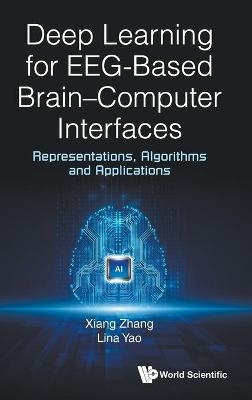
Deep Learning for EEG-Based Brain-Computer Interfaces
World Scientific Europe Ltd (Verlag)
978-1-78634-958-3 (ISBN)
Deep Learning for EEG-based Brain-Computer Interfaces is an exciting book that describes how emerging deep learning improves the future development of Brain-Computer Interfaces (BCI) in terms of representations, algorithms, and applications. BCI bridges humanity's neural world and the physical world by decoding an individuals' brain signals into commands recognizable by computer devices.
This book presents a highly comprehensive summary of commonly-used brain signals; a systematic introduction of around 12 subcategories of deep learning models; a mind-expanding summary of 200+ state-of-the-art studies adopting deep learning in BCI areas; an overview of a number of BCI applications and how deep learning contributes, along with 31 public BCI datasets. The authors also introduce a set of novel deep learning algorithms aimed at current BCI challenges such as robust representation learning, cross-scenario classification, and semi-supervised learning. Various real-world deep learning-based BCI applications are proposed and some prototypes are presented. The work contained within proposes effective and efficient models which will provide inspiration for people in academia and industry who work on BCI.
Xiang Zhang is a postdoc fellow at Harvard University, working with Prof. Marinka Zitnik in Machine Intelligence for Medicine and Science (MIMS) lab. He received his PhD degree (in 2020) at School of Computer Science from the University of New South Wales (UNSW) while supervised by Dr Lina Yao. Xiang has a number of publications on the top venues including SIGKDD, ICDM, UbiComp, IJCAI, PerCom, AAAI, ACM TIST, and IEEE Internet of Things Journal. Moreover, Xiang has been awarded Google PhD Fellowship 2018 in Human Computer Interface on a super competitive basis (4 recipients in Australia among 57 recipients global). He was also selected for EPFL Engineering PhD Summit (11 winners out of 200+ applicants). Xiang's research interests lay in graph representation learning, data mining, and deep learning with focusing applications on neurological diagnosis, user authentication, biomedical sciences, health care, and Brain-Computer Interface (BCI). Lina Yao is currently a Scientia Senior Lecturer at School of Computer Science and Engineering, the University of New South Wales (UNSW). She was awarded Australia Research Council (ARC) Discovery Early Career Researcher Award (DECRA) and Inaugural Vice Chancellor's Women's Research Excellence Award (University of Adelaide) in 2015, and Scientia Fellowship (UNSW) in 2020. She currently serves as Associate Editor for ACM Transactions on Sensor Networks (TOSN) and PC members of several most prestigious data mining and machine learning international conferences including NeurIPS, KDD, SIGIR, AAAI, IJCAI, ICDM, and ACM MM. Lina has published around 200 papers on top journal and conferences, along with four books/chapters. Lina is directing the Data Dynamics Lab (D² Lab) that strives for developing novel data mining, machine learning and deep learning algorithms — as well as designing systems and interfaces — to enable novel ways of human-machine interactions, including an improved understanding of challenges such as robustness, trust, explainability and resilience that improve human-autonomy partnership. Her research is motivated by, and contributes to, various applications in Information Filtering, Healthcare Informatics, Cyber Security, Transportation, Industry 4.0 and E-commerce.
Introduction; Brain Signal Acquisition; Deep Learning Foundations; Deep Learning-based BCI; Deep Learning-Based BCI Applications; Robust Brain Signal Representation Learning; Cross-Scenario Classification; Semi-Supervised Classification; Authentication; Visual Reconstruction; Language Interpretation; Intent Recognition in Assisted Living; Patient-Independent Neurological Disorder Detection; Future Directions and Conclusion;
| Erscheinungsdatum | 07.10.2021 |
|---|---|
| Verlagsort | London |
| Sprache | englisch |
| Themenwelt | Informatik ► Theorie / Studium ► Künstliche Intelligenz / Robotik |
| ISBN-10 | 1-78634-958-2 / 1786349582 |
| ISBN-13 | 978-1-78634-958-3 / 9781786349583 |
| Zustand | Neuware |
| Haben Sie eine Frage zum Produkt? |
aus dem Bereich


